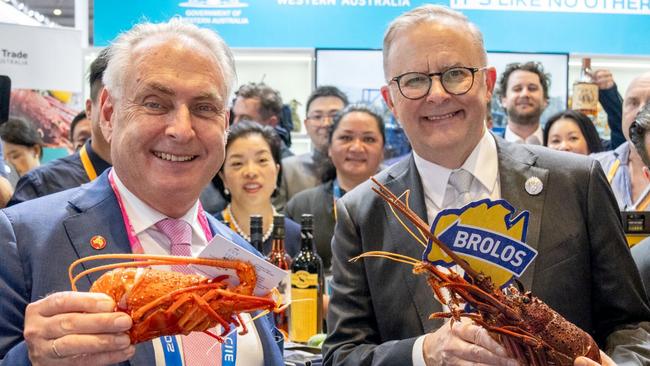Nice to be in good books with Beijing, but the catch remains
The three-night visit marks the return of Australia to the group of countries that have strained, rather than appalling, relations.

It didn’t take a trip to China to confirm Canberra has a profoundly different idea to Beijing of what it means to play by the rules of international trade.
Xi Jinping’s government, without any embarrassment, has pressed Australia to support its bid to join the high-standard CPTPP trade pact all the way through its three-year trade coercion campaign. It has ramped it up still further ahead of the Anthony Albanese’s trip.
“We have different political systems. We have different values,” the Prime Minister said on Sunday in Shanghai.
This gulf has widened markedly during Xi’s 11 years in power. It is the reason Canberra, rightly, has set modest expectations for where the relationship can go from here.
Chinese Premier Li Qiang pushed the CPTPP case again
on Sunday. His boss Xi will take over China’s trade-pact lobbying on Monday in Beijing.
The temperature in China’s capital will plunge to the single digits, a suitably chilly setting as the trip’s focus switches from warm trade ties to the frosty geopolitical tension and knotty bilateral disputes that continue to hang over the relationship.
Albanese seemed to enjoy his balmy day in Shanghai, even if many of the locals weren’t quite sure who was the man in the green and gold exercise kit on the Bund. “I thought this was maybe some actor or an entrepreneur or CEO,” a 20-something said.
The man with the Rabbitohs cap was, of course, the first Australian prime minister to visit China since 2016, out for some exercise with a modest security detail before a day with Australia’s China-focused business community.
Another Shanghainese, learning who he was, could not believe that he had waved and said hello to an Australian journalist – me actually, also out for a morning run. That a leader would interact with the public was shocking. “This could never happen in China,” she said in disbelief.
It was a small example of the profound gulf that separates our countries: one a medium-sized liberal-democracy, the other a giant, secretive Leninist party state, which also happens to be our biggest trading partner.
Beijing has billed this trip as a historic trip of “great significance”, and in a way it is. The three-night visit marks the return of Australia to the group of countries that have strained, rather than appalling, relations with Beijing.
The lead-up to the China International Import Expo trade show tells the story. In 2020, China used the event to send a signal that it was out to wound Australia. Weeks before that year’s expo, Australian winemakers discovered their product was not being cleared by Customs. Days before the trade show opened, Chinese officials blocked a $2m cargo of live Australian lobster on the Shanghai airport tarmac. Their deaths marked the beginning of the unofficial blacklisting that remains in place today.
Thankfully, in the lead up to this expo, Australian businesses have been learning good rather than bad news as Beijing has lifted most of those trade restrictions.
“The change is unbelievable,” a senior Australian diplomat engaged in the last four dramatic years said in Shanghai on Sunday.
The lobster industry, the last on the blacklist, got another signal that the PM’s trip will finally bring them relief too. Trade Minister Don Farrell on Sunday said his meeting the evening before indicated it would be “a very short period time” until they were back.
Australia’s China-focused business community hopes the improved political relationship will create space for new business opportunities and deal making.
Albanese wants to help with that – up to a point. He is the Prime Minister, not the Trade Minister. He also needs to think about Australia’s security as well as its economy. And while he may have been channelling John Howard with his Team Australia exercise routine, Australia’s relations with China are not going back to those simpler times of the pre-Xi era.




To join the conversation, please log in. Don't have an account? Register
Join the conversation, you are commenting as Logout